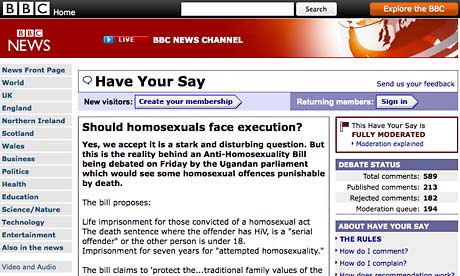
The BBC headline 'Should homosexuals face execution?' may be insensitive, but it has drawn attention to anti-gay legislationLance Price of The Guardian nails it. (The backstory is here, if you want more details.) We have embraced the "shoot the messenger" mindset. The BBC is asking whether we can realistically tolerate Uganda's proposed death penalty for homosexuality or for having AIDS. Predictably, but sadly, that organization has backpedaled and apologized, and as best as I can tell, removed the offending article and poll.
The headline on the BBC website "Should homosexuals face execution?" provoked predictable outrage. Predictable but, in my view, misdirected.
The anger of those who demanded (successfully) that it be changed was understandable, although as a gay man I was no more offended than if it had read "Did the Jews deserve the Holocaust?" or "Is the US right to execute more blacks than whites?" In each case the question is so outrageous that it doesn't deserve to be dignified with an answer. But that doesn't mean it shouldn't be asked.
The original headline on our website was, in hindsight, too stark. We apologise for any offence it caused. But it's important that this does not detract from what is a crucial debate for Africans and the international community.Would it be reasonable for me to be offended by a horrifying story of a murder? Perhaps if it was written to highlight grisly details, but it's a story, and if it's in my town, I ought to know about it. The act is what I should be offended by, not the story.
The programme was a legitimate and responsible attempt to support a challenging discussion about proposed legislation that advocates the death penalty for those who undertake certain homosexual activities in Uganda - an important issue where the BBC can provide a platform for debate that otherwise would not exist across the continent and beyond.
My position for my adult life is and has been this: "News is not what I want to know, it's what I need to know." The point being that there's an awful lot of stuff I'd rather wasn't true. But it is. And I'm not going to be a very good decision-maker if I willfully ignore simple facts because I simply don't like them.
The attitude displayed here is what has allowed Faux News to become such a powerful media voice: they tell their audience what the audience wants to know, not what they need to know. To the extent Faux broaches topics that are unsavory, they pretty much set the topics up as straw men, and proceed to handily demolish them. So all the innocent little children in TV land can nod off with visions of their sugarplum Jayzus dancing in their heads.
The closing paragraph of the op-ed quoted at the outset is perfect:
The headline may have been insensitive. The journalist who wrote it probably wishes she or he never had. It made a lot of people very angry. That matters not a jot so long as they come to recognise where that anger should really be directed.It saddens me more deeply than I can express that "The journalist who wrote it probably wishes she or he never had." It does not bode well for a society when its productive members regret doing the job they're supposed to do.










No comments:
Post a Comment